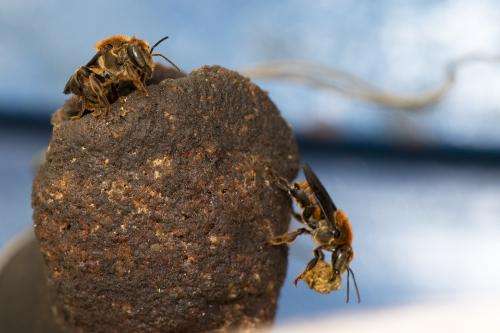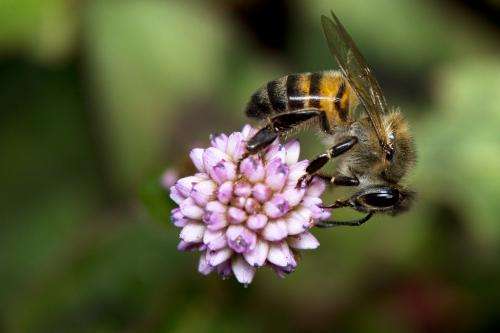Protecting Africa's bees for world food security

Scientists in a new, world-class laboratory in Kenya will work to protect Africa's bees and help farmers produce top-quality honey and wax for international markets. Located at the International Centre of Insect Physiology and Ecology (ICIPE) in Nairobi, Kenya, it will improve our understanding of these unique creatures and boost food security by protecting these important pollinators.
Launched this week by H.E. Hon. William Ruto, Deputy President of Kenya, at an event attended by Ambassadors, High Commissioners, government officials and dignitaries from Africa, Europe and around the world, the African Reference Laboratory for Bee Health is the centrepiece of a three-year project funded by the European Union in Kenya worth Kshs 1.7 billion (€14.7 million). It was constructed with the support of ICIPE's core donors: The German Federal Enterprise for International Cooperation (GIZ) on behalf of the German Federal Ministry for Economic Cooperation and Development (BMZ), the Government of Kenya, the Swedish International Development Cooperation (Sida), the Swiss Agency for Development and Cooperation (SDC) and UK Aid.
In Africa and worldwide, bees are crucial for agriculture and the environment. More than 70% of the world's major crops rely on bee pollination to produce fruits and seeds. Bees also provide much-needed extra income for smallholder farmers, who sell honey, wax and other products.
However, honeybee populations across the world are struggling to overcome attacks from parasites such as the varroa mite and infection with diseases, as well as the dreaded Colony Collapse Disorder that has decimated bee populations in the USA and parts of Europe. The laboratory will endeavour to understand and prevent these problems from taking hold in Africa.
"Bees and other pollinators are significant contributors to food security and ecosystem health. Bees improve the environment and they do not prey on any other species. Aside from crops, bees also pollinate grasses and forage plants, therefore contributing indirectly to meat and milk production," said Dr Segenet Kelemu, Director General and CEO of ICIPE.
The first step in protecting African bees is to know what pests and diseases are already out there. With a network of four satellite stations, in Burkina Faso, Cameroon, Liberia and Ethiopia, the laboratory will train researchers across the continent to monitor the health of bee populations to detect emerging pests and diseases and respond before they threaten our food security.

"Together with our colleagues in the Ministry of Agriculture, the European Union is proud to be supporting this ground-breaking research. It will protect African bees, agricultural economies, farmers' livelihoods and food production over the long term. And my thanks to our partners at the African Union, who will ensure the benefits of this research are felt all over the continent," said the European Union Ambassador Lodewijk Briët.
The programme will take stock of the remarkable biodiversity of bees in Africa, looking for undiscovered bees that might be better pollinators, or more resistant to diseases, which will help us identify new types of bees to domesticate and breed.
"Africa is home to an amazing diversity of well-adapted bees, including honeybees, stingless bees and carpenter bees," said Prof. Suresh Raina, Team Leader of the ICIPE's Commercial Insects Programme. "My team at ICIPE, together with our partners, have already found that some African honeybees are resistant to certain diseases which affect European honeybees. By training researchers across Africa, we can find out what else is out there."
Looking beyond bee health and protecting crop pollination, the laboratory will also work to boost rural livelihoods by developing community-owned marketplaces for honey, wax and other bee products. It will train farmers to produce value-added products and develop testing and certification procedures, which will open access to markets across Africa and beyond.
ICIPE will lead this three-year EU Bee Health Project in partnership with the African Union Inter-African Bureau for Animal Resources (AU-IBAR), bringing together research into bee health from across Africa and the world, working to boost food security and protect biodiversity in Africa by mitigating the threats to bee populations.
"Innovative science and research have a vital role to play in safeguarding Kenya's food supply," said European Union Ambassador Lodewijk Briët. "This is why we have also funded the development of vaccines for livestock and new drought-resistant crops. Over the next six years the European Union will be providing Kshs 22.5 billion of development funding to Kenyan organisations to increase food production and agricultural development, particularly in arid areas of the country."
While ICIPE and its partners do the research, AU-IBAR will formulate a Pan-African Apiculture Policy Framework. Focusing on honeybee production, pollination services and bee health, the overall objective is to facilitate the development of coherent policies at a national, regional and continental level.
This Africa-wide approach will allow for the incorporation of strategies, harmonised procedures and legislation on bee health into national development agendas to take full advantage of the benefits of bees and beekeeping.
"We need to work at a continental level to ensure that bees in Africa stay healthy and productive," says Dr Simplice Nouala, Chief Animal Production Officer for AU-IBAR. "This central reference laboratory can help to coordinate research across the continent, linking in with marketplaces, NGOs, the private sector, and national agricultural research systems to boost agricultural productivity and rural incomes."
The African Reference Laboratory for Bee Health builds on ICIPE's long experience in bee health research. Since the start of ICIPE's Commercial Insects Programme in 1995, the programme has grown into a large team of researchers, technicians and students across Africa, who will use the laboratory to:
- fight pests and diseases of bees, such as the varroa mite and Nosema apis, which can cause the death of entire colonies, and prevent the dreaded Colony Collapse Disorder, which is decimating bee populations in Europe and the USA, from taking hold in Africa
- breed queen bees which are resistant to disease, are better honey producers or more effective pollinators, tapping into the vast biodiversity of bee species in Africa
- monitor trends in bee populations to spot early signs of pests or disease, and to take stock of the biodiversity of bee populations
- train researchers at satellite stations in Burkina Faso, Cameroon, Liberia and Ethiopia to monitor bee populations and bee health across Africa
- share knowledge about bees and beekeeping with farmers and researchers, serving as a hub of evidence-based information and raising the standards and productivity of beekeepers
- test honey and other bee products for pesticide residues and quality, which will open up markets in Europe for African beekeepers.
Provided by International Centre of Insect Physiology and Ecology



















